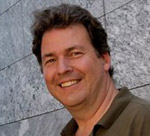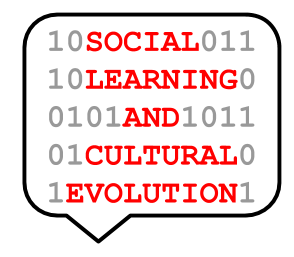Keynote 1

Dr Richard Watson
Associate Professor - School of Electronic Engineering, University of Southampton (UK)
Bio:
Richard is a member of the Natural Systems research group at the University of Southampton and a local co-ordinator of the Extended Evolutionary Synthesis integrative research program. Richard's interest can be summarised as "evolution and all things evolutionary", he aims to understand the algorithmic principles of biological evolution and has published on topics spanning artificial life, robotics, evolutionary computation, population genetics, neural networks and computational biology.
Talk Title:
"An antidote to ‘universal Darwinism’: A scientific worldview where self-interest is not the prime mover"
Description:
The prevailing scientific (traditionally Western) worldview sees self-interest and competition as natural and logical. 'Natural' because it is supported by evolutionary theory ("survival of the fittest") and 'logical' because it is supported by rational individualism ("the only logical action for me is to do what’s best for me"). This worldview creates isolation, greed and unsustainable exploitation that is harmful to us as individuals, harmful to us as a society and global community, and harmful to other living things and the bioshpere. But if working together requires that we are perpetually swimming against the current - fighting what is natural and logical - maybe we should just give-in to selfishness - isolate ourselves and stop caring... A different worldview (familiar within Eastern ‘Wisdom traditions’) sees a larger tapestry of living things. A ‘harmonious web of life’ if you like. In this view, there is no aim to 'win' or out-compete others – only to find harmony with nature, to live with ease and balance, playing a role contextualised within the greater whole. With this worldview, cooperation, synergy and working together is natural and wise.
However, according to the dominant narrative within much of scientific thought, there is no basis for the idea that life around us is organised in a way that supports any holistic functional organisation. Natural selection is the only known mechanism shown to be capable of producing adaptive complexity – and it has been argued quite convincingly that it is the only possible mechanism of adaptation in the natural universe (hence universal Darwinism). It does not apply to systems like ecosystems or the biosphere or societies because they are not evolutionary units (in particular, they do not reproduce). Above the scale of individual organisms it is competition, not harmony, that is the ‘prime mover’. So, whilst ecosystems and societies might certainly be complicated, and sometimes cooperating with others might be to your advantage, basically – it's a jungle out there.
Recent work, however, shows that natural selection is not the only possible naturally occurring mechanism that can produce adaptive complexity. Natural induction works through a different principle; not differential survival and reproduction of entities but the differential easing of relationships between entities. It therefore operates without the requirement of reproduction and outside the limitations of natural selection. It does not suggest that all natural systems are harmonious or adaptively organised – but it does suggest a different value system – one based not on competitive exclusion, but on the distributed knowledge stored in the connective tissues of a complex dynamical system. This has potential to support a worldview that is a valuable antidote to universal Darwinism and rational individualism. And perhaps to ease the eagerness to exploit one another and the planet.
Lent, J. (2021) The Web of Meaning, Profile Books. || Dawkins, R. (1976). The Selfish Gene. Oxford. || Dawkins, R. (1983). “Universal Darwinism”. in Evolution from molecules to men, 403-425. || Hayek, F. A. (1980). Individualism and economic order. University of chicago Press. || Watson, R.A. & Buckley, C.L. (forthcoming) “Natural Induction”, manuscript in prep. || Watson, R.A. & Lewens, T. (forthcoming) “Evolution by Natural Induction”, manuscript in prep. || Watson, R.A. & Levin, M. (forthcoming) “The Collective Intelligence of Evolution”, in submission. || Watson, R. A., & Szathmáry, E. (2016). How can evolution learn?. Trends in ecology & evolution, 31(2), 147-157. || Power, D. A., et al. (2015). What can ecosystems learn? Expanding evolutionary ecology with learning theory. Biology direct, 10(1), 1-24. || Watson, R. A., Mills, R., & Buckley, C. L. (2011). Global adaptation in networks of selfish components. Artificial Life, 17(3), 147-166. || Davies, A. P., et.. al (2011). “If you can't be with the one you love, love the one you're with”: How individual habituation of agent interactions improves global utility. Artificial Life, 17(3), 167-181. || Watson, R. A., Buckley, C. L., & Mills, R. (2011). Optimization in “self‐modeling” complex adaptive systems. Complexity, 16(5), 17-26.
Talk Schedule:
15:10 - 15:50 (CEST)
Panel Discussion:
Session 1 Panel, 16:30 - 17:00 (CEST)
Keynote 2

Prof Mark Bedau
Professor of Philosophy and Humanities - Reed College (USA)
Bio:
Mark is co-editor-in-chief of the Artificial Life journal and a former president of the International Society of Artificial Life. Mark is a leading figure in the Open-ended-evolution community, having to co-developed the "ALife test" for unbounded evolutionary dynamics and co-organised the OEE workshop series. Mark's interest in Cultural Evolution focuses primarily on (open-ended) technological innovation.
Talk Title:
"Patented technology as a model system for cultural evolution and social learning."
Description:
I argue that the study of cultural evolution and social learning could benefit from identifying and studying certain model systems, akin to the model organisms studied in biology, and that patented technology would make an excellent model system. First, I review the distinctive epistemic benefits provided by model organisms in biology, and explain why analogous model cultural systems would provide an analogous epistemic benefits for the study of cultural evolution and social learning. Second, I show that patented technology has the hallmarks of an excellent model system for at least three important issues: the way traits flow in the hyper-parental genealogies that are characteristic of cultural evolution and social learning, the open-ended innovation characteristic of those same systems, and the new automated methods and tools for mining digital data sets to visualize and quantify the evolution of cultural traits.
Talk Schedule:
18:00 - 18:40 (CEST)
Panel Discussion:
Session 2 Panel, 19:10 - 19:30 (CEST)
